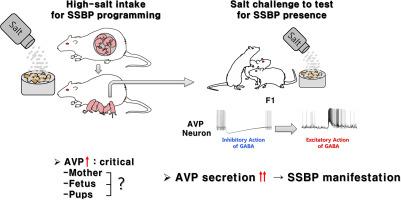Journal of Molecular and Cellular Cardiology ( IF 4.9 ) Pub Date : 2020-10-02 , DOI: 10.1016/j.yjmcc.2020.09.013 Young-Beom Kim 1 , Won Woo Jung 1 , Seung Won Lee 1 , Xiangyan Jin 1 , Hyung Kyung Kang 1 , Eun-Hwa Hong 1 , Sun Seek Min 2 , Yoon-Sik Kim 1 , Hee Chul Han 1 , Christopher S Colwell 3 , Yang In Kim 1

|
Salt sensitivity of blood pressure (SSBP) is a trait carrying strong prognostic implications for various cardiovascular diseases. To test the hypothesis that excessive maternal salt intake causes SSBP in offspring through a mechanism dependent upon arginine-vasopressin (AVP), we performed a series of experiments using offspring of the rat dams salt-loaded during pregnancy and lactation with 1.5% saline drink (“experimental offspring”) and those with normal perinatal salt exposure (“control offspring”). Salt challenge, given at 7–8 weeks of age with either 2% saline drink (3 days) or 8% NaCl-containing chow (4 weeks), had little or no effect on systolic blood pressure (SBP) in female offspring, whereas the salt challenge significantly raised SBP in male offspring, with the magnitude of increase being greater in experimental, than control, rats. Furthermore, the salt challenge not only raised plasma AVP level more and caused greater depressor responses to V1a and V2 AVP receptor antagonists to occur in experimental, than control, males, but it also made GABA excitatory in a significant proportion of magnocellular AVP neurons of experimental males by depolarizing GABA equilibrium potential. The effect of the maternal salt loading on the salt challenge-elicited SBP response in male offspring was precluded by maternal conivaptan treatment (non-selective AVP receptor antagonist) during the salt-loading period, whereas it was mimicked by neonatal AVP treatment. These results suggest that the excessive maternal salt intake brings about SSBP in male offspring, both the programming and the expression of which depend on increased AVP secretion that may partly result from excitatory GABAergic action.
中文翻译:

母体盐摄入过多会导致男性后代血压升高,对盐敏感
血压盐敏感性(SSBP)是一种对各种心血管疾病具有强烈预后意义的特征。为了验证母体盐摄入过多通过依赖于精氨酸加压素 (AVP) 的机制导致后代出现 SSBP 的假设,我们使用在怀孕和哺乳期间摄入盐分的大鼠后代进行了一系列实验,并喝了 1.5% 的盐水。 “实验后代”)和那些围产期盐暴露正常的孩子(“对照后代”)。盐挑战,在 7-8 周龄时给予 2% 盐水饮料(3 天)或 8% 含氯化钠食物(4 周),对雌性后代的收缩压 (SBP) 影响很小或没有影响,而盐挑战显着提高了雄性后代的收缩压,实验大鼠的升高幅度大于对照大鼠。此外,与对照男性相比,盐刺激不仅使实验男性的血浆 AVP 水平更多地升高,并引起对 V1a 和 V2 AVP 受体拮抗剂更大的抑制反应,而且还使实验男性中相当大比例的大细胞 AVP 神经元中的 GABA 兴奋。通过去极化 GABA 平衡电位来抑制雄性。在盐负荷期间,母亲考尼伐坦治疗(非选择性 AVP 受体拮抗剂)排除了母亲盐负荷对雄性后代盐挑战引起的 SBP 反应的影响,而新生儿 AVP 治疗则模拟了这种影响。这些结果表明,母体盐摄入过多会导致雄性后代出现 SSBP,其编程和表达都依赖于 AVP 分泌的增加,而这可能部分是由于兴奋性 GABA 能作用所致。









































 京公网安备 11010802027423号
京公网安备 11010802027423号